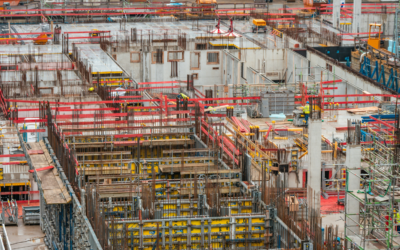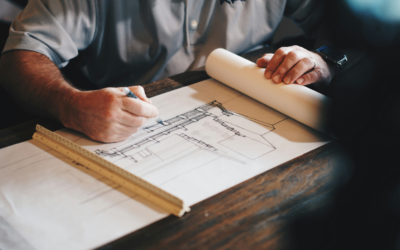Imagine orchestrating a symphony without a conductor. The result would be chaotic, with each musician playing their part without cohesion. This is how a construction project would feel without the oversight of a skilled construction inspector. For real estate developers, understanding the role of construction inspectors is crucial to ensuring projects are completed efficiently, safely, and in compliance with regulations.
Construction inspectors are the unsung heroes of development projects. They ensure that every nail hammered, every pipe laid, and every beam erected meets stringent quality standards. In this blog post, we will explore the multifaceted role of construction inspectors, the importance of quality control, and how technology is revolutionizing the field. We’ll also provide practical tips on working effectively with inspectors and share insights into future trends.
What is a Construction Inspector?
A construction inspector is a professional responsible for overseeing construction projects to ensure they meet all pertinent building codes, zoning regulations, and contract specifications. From residential homes to large commercial complexes, construction inspectors play a vital role in safeguarding public safety and enhancing the quality of the built environment. They perform meticulous inspections at various stages of construction, verifying that materials, structural integrity, and workmanship adhere to regulatory standards. Equipped with extensive knowledge of engineering principles, construction methods, and legal requirements, these inspectors serve as the bridge between project plans and their successful execution.
Importance of Quality Control in Construction
In the world of real estate development, quality is non-negotiable. Construction inspectors play a pivotal role in maintaining high standards by conducting regular inspections and ensuring compliance with building codes and regulations. Their work prevents costly mistakes, delays, and potential legal issues.
Ensuring quality starts from the very beginning of a project. Inspectors assess the initial plans and materials, making sure everything aligns with local building codes and zoning regulations. Throughout the construction process, they monitor progress, identify any deviations from the plan, and enforce corrective measures. This meticulous approach guarantees that the final structure is safe, durable, and up to code.
For real estate developers, partnering with diligent construction inspectors means peace of mind. It signifies knowing that the project will not only meet but exceed expectations. Quality control is the foundation upon which successful developments are built, fostering trust and satisfaction among stakeholders.

Key Duties of a Construction Inspector
Construction inspectors wear many hats, each one essential to the successful completion of a project. Their primary responsibilities include:
- Structural Integrity Checks: Inspectors ensure that the framework of the building is sound, from the foundation to the roof. They verify that materials and construction techniques meet specific standards.
- Safety and Compliance Inspections: Safety is paramount on construction sites. Inspectors review safety protocols, check for potential hazards, and ensure that workers adhere to safety regulations.
- Documentation and Reporting: Accurate recordkeeping is vital. Inspectors document their findings, noting any discrepancies or issues. These reports are crucial for future reference and legal compliance.
By covering these key areas, construction inspectors help safeguard the interests of developers, investors, and future occupants. Their expertise ensures that the project progresses smoothly and meets all necessary standards.
Types of Construction and Building Inspectors
Construction and building inspection is a diverse field, encompassing various specializations to address different aspects of construction projects. Understanding the different types of inspectors can help developers engage the right expertise for their projects. Here are some key types of construction and building inspectors:
- Building Inspectors: Focused on the overall construction process, building inspectors ensure that structures meet building codes and zoning laws. They review the construction of residential, commercial, and industrial buildings, checking everything from foundations to roofing.
- Electrical Inspectors: These inspectors specialize in ensuring that all electrical systems within a building comply with relevant codes and safety standards. They check wiring, circuit breakers, lighting, and other electrical installations to prevent hazards like electrical fires.
- Plumbing Inspectors: Responsible for inspecting the installation of plumbing systems, plumbing inspectors verify that water supply, drainage, and sewage systems are correctly installed and functioning. They ensure that plumbing work meets health and safety regulations.
- Mechanical Inspectors: These professionals focus on the mechanical systems within a building, such as heating, ventilation, air conditioning (HVAC), and refrigeration systems. Mechanical inspectors check that these systems are installed properly and operate efficiently.
- Structural Inspectors: Specializing in the structural integrity of buildings, structural inspectors assess the components that support and transfer loads, such as beams, columns, and trusses. Their work is crucial in preventing structural failures.
- Fire Safety Inspectors: Ensuring that buildings are equipped to handle fire emergencies, fire safety inspectors review fire alarm systems, sprinkler systems, and fire exits. They confirm that fire safety measures comply with local regulations and codes.
- Energy Inspectors: With a growing emphasis on sustainability, energy inspectors evaluate the energy efficiency of buildings. They assess insulation, window sealing, and HVAC efficiency to recommend improvements that reduce energy consumption and enhance environmental performance.
These specialized inspectors work together to provide comprehensive oversight on construction projects, ensuring that all aspects meet required standards and contribute to the creation of safe, functional, and efficient buildings.

Qualifications Construction and Building Inspectors Have
Construction and building inspectors must possess a unique blend of education, experience, and personal attributes to effectively perform their duties.
Here are some key qualifications these professionals typically have:
- Educational Background: Most inspectors hold at least a high school diploma, but many have furthered their education with a license or certification, associate degrees, or bachelor’s degrees in fields such as civil engineering, architecture, construction management, or related disciplines.
- Relevant Experience: Practical experience in the construction industry is highly valued. Many inspectors start their careers as tradespeople, engineers, or in other construction-related roles, gaining hands-on knowledge and expertise that they can apply to their inspection duties. They also need this experience for recordkeeping and reporting duties of the construction trade.
- Certification and Licensing: Depending on the region, inspectors may need to obtain specific certifications or licenses. Recognized certifications, such as those from the International Code Council (ICC), demonstrate a solid understanding of relevant codes and standards.
- Strong Analytical Skills: Inspectors must be adept at assessing construction plans and blueprints, as well as identifying and resolving complex issues on-site.
- Attention to Detail: Given the regulatory and safety implications of their work, inspectors must maintain meticulous attention to detail to ensure all construction elements meet required standards.
- Communication Skills: Effective communication is essential for providing clear reports, discussing findings with contractors and developers, and explaining necessary corrective measures.
- Physical Fitness: Building inspectors typically need to navigate challenging construction sites, which may involve climbing, balancing, and working in various weather conditions. Physical fitness is important for performing these tasks safely and effectively in the inspection business.
- Understanding of Building Codes and Regulations: A comprehensive understanding of local, state, and national building codes and regulations is crucial. Inspectors must stay current with changes in legislation and standards to ensure compliance.
- Problem-Solving Abilities: Inspectors frequently encounter unforeseen issues that require innovative and effective solutions to keep projects on track.
These qualifications enable construction and building inspectors to deliver thorough and accurate assessments, ensuring that construction projects adhere to all safety, quality, and legal requirements.

The Impact of Construction Technology on Construction Inspections
Gone are the days when construction inspection relied solely on manual efforts. Technology has ushered in a new era of efficiency and accuracy. Let’s explore some groundbreaking advancements in building inspection technology:
- Drones for Aerial Inspections: Drones equipped with high-resolution cameras provide a bird’s-eye view of construction sites. They can access hard-to-reach areas and capture detailed images for analysis, reducing the need for physical inspections.
- Artificial Intelligence (AI): AI algorithms analyze data from various sources, such as sensors and cameras, to identify potential issues in real-time. This proactive approach allows for immediate corrective actions, minimizing delays and costs.
- Advanced Testing Equipment: Modern tools like thermal imaging cameras and ground-penetrating radar enable inspectors to detect hidden defects, such as moisture intrusion or structural weaknesses, that might go unnoticed with the naked eye.
These technological innovations are transforming the way inspections are conducted, enhancing accuracy and efficiency. For real estate developers, leveraging these tools means staying ahead of the curve and ensuring top-notch quality in every project.
How to Work Effectively with Construction Inspectors
Collaboration between developers and inspectors is essential for project success. Here are some tips to foster a productive relationship:
- Clear Communication: Establish open lines of communication from the start. Discuss project goals, timelines, and any specific concerns. Regular updates and feedback sessions ensure everyone is on the same page.
- Respect Their Expertise: Construction inspectors bring valuable knowledge and experience to the table. Trust their judgment and be open to their recommendations. Their insights can prevent potential issues and improve project outcomes.
- Proactive Approach: Involve inspectors early in the project. Early-phase inspections help identify and address issues before they escalate. This proactive approach saves time and resources in the long run.
By fostering a collaborative environment, developers can leverage the expertise of construction inspectors to achieve their project goals efficiently and effectively.
The Future of Construction Inspection
The construction industry is constantly evolving, and so is the field of inspection. Here are some trends and innovations to watch out for:
- Sustainable Building Practices: As sustainability becomes a priority, inspectors will play a crucial role in ensuring that projects adhere to green building standards. This includes verifying energy-efficient systems, environmentally friendly materials, and sustainable construction techniques.
- Integration of IoT (Internet of Things): IoT devices, such as smart sensors and connected equipment, provide real-time data on various aspects of construction. Inspectors can leverage this data to monitor progress, detect anomalies, and ensure compliance.
- Enhanced Training and Certification: The demand for skilled inspectors will continue to grow. Ongoing training and certification programs will equip inspectors with the latest knowledge and skills, ensuring they stay updated with industry trends and best practices.
For real estate developers, staying informed about these trends and innovations is essential to remain competitive and deliver high-quality projects.

Conclusion
Construction inspectors are the backbone of quality and safety in real estate development. Their expertise, combined with advancements in technology, ensures that projects are executed to the highest standards. By understanding the critical role of inspectors, fostering collaboration, and staying updated with industry trends, developers can achieve excellence in their projects.
Ready to elevate your next project? Reach out to us at South Coast Improvement Company.
Learn More About Construction Inspectors
To gain a deeper understanding of the vital role construction inspectors play in the industry, explore the following resources:
- Construction Inspector Job Description: An in-depth look at the responsibilities, skills, and qualifications required for construction inspectors, provided by the Bureau of Labor Statistics.
- International Code Council (ICC): The ICC offers certifications and resources to ensure inspectors are up-to-date with the latest codes and standards.
- National Association of Home Inspectors (NAHI): Provides information on home inspection standards, training programs, and professional development opportunities.
- American Society of Home Inspectors (ASHI): A professional organization that sets industry standards and offers resources for home inspectors, including continuing education.
- Building Codes and Standards: A comprehensive guide to understanding building codes and standards, crucial for any construction inspector.
These resources offer valuable insights into the profession, helping you stay informed and prepared for the dynamic field of construction inspection.
View Our Work
Aspen Dental
Partnering with The Aspen Group on the construction of a new Aspen Dental facility that’s functional & welcoming for patients & staff alike. South Coast Improvement Company was awarded the construction of a new Aspen Dental facility in Killingly, CT. The...
Springhouse Senior Living – HumanGood
Designed to enhance comfort & functionality. South Coast Improvement company was hired by HumanGood for an interior and exterior renovation at Springhouse Senior Living. Our skilled teamtransformed the 2nd through 5th floor common areas into brighter, more...






